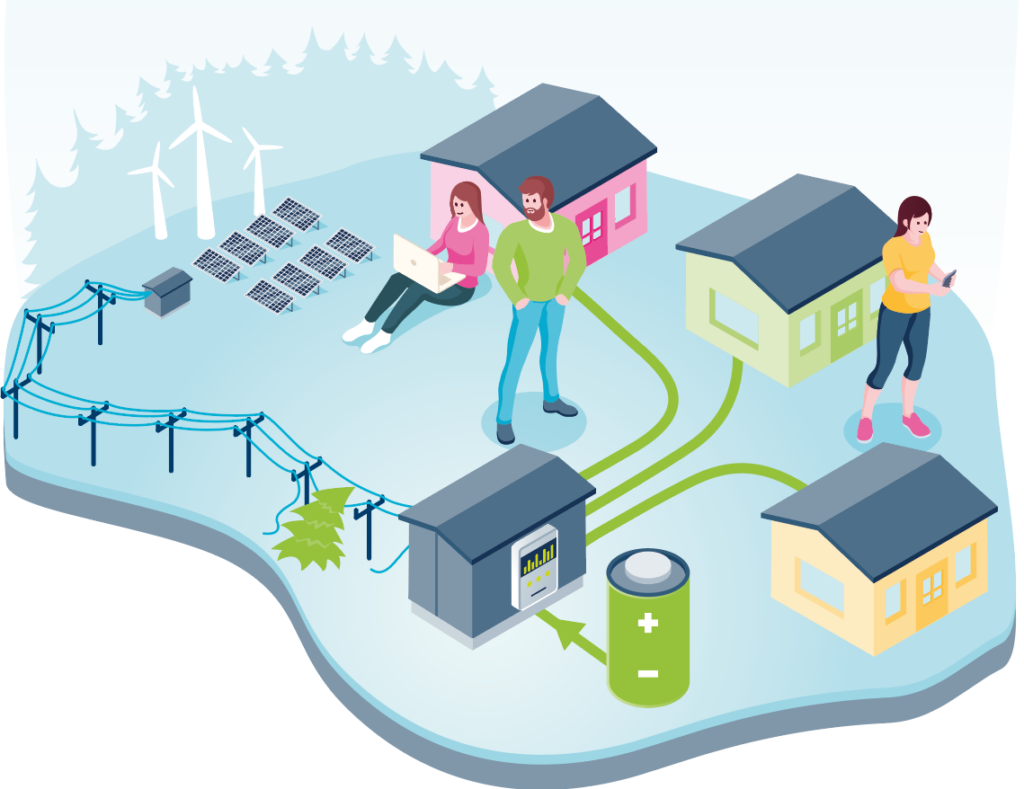Usage of energy storage systems is progressing as Elenia secures electricity distribution
Distribution system operator Elenia's project to utilize energy storages in order to secure electricity distribution is progressing. Elenia has chosen Finnish Merus Power as an innovation partner in the utilization of energy storage solutions alongside Fortum.
Elenia is building two energy storages in Pirkanmaa, Finland, as part of an innovation partnership with Merus Power and Fortum. Elenia owns the network connection equipment of the solution and purchases battery capacity as a service from Fortum, who owns the energy storages. The locations of these energy storage systems are currently being planned and the equipment will be commissioned by the summer of 2022.
In total, Elenia plans to build dozens of energy storage systems over the next few years, especially in areas where overhead lines have remaining service life, but underground cabling is not relevant in the upcoming years.
“Our goal is to expand the use of energy storage systems in sparsely populated areas as a solution that can ensure the security of electricity distribution in the event of power outages caused by storms and snow loads, among other things. The batteries keep the electricity on for our customers in sparsely populated areas, where this solution is the fastest way to improve the weather safety of electricity distribution.” says Tommi Lähdeaho, Elenia's Unit manager.
Merus Power supplies the energy storage systems and their network connection devices to Elenia and Fortum. Elenia and Fortum use these energy storage systems to store energy in the event of a power failure and as a control force to maintain the balance of the electrical system. Under normal circumstances, Fortum utilizes the capacity of the energy storage systems in the energy market when they are not needed for electricity distribution.
“Energy storages are expected to be a significant part of electricity systems in the future, as they have a remarkable ability to secure electricity distribution in all conditions, and they increase flexibility in the electricity market." says Aki Leinonen, Sales Director of Merus Power.
Climate change requires new solutions for flexibility
The energy revolution and climate change will further increase the need to regulate electricity as the share of weather dependent wind and solar energy in electricity production increases. The electrification of society also increases the need for regulation.
“Energy storages are needed as electricity production becomes more volatile as weather-dependent renewable energy production increases, since the production and consumption must always be in balance. With energy storages, we obtain a fast control force on the market that responds to fluctuations in production and consumption faster than traditional power plants.” says Ilari Alaperä, Fortum's Business Development Manager.
“Energy storage becomes a solution for balancing peak consumption. We can sell energy storage capacity to the grid reserve market when the energy storage is not needed for electricity distribution. This will increase economic efficiency.” Alaperä continues.
Elenia and Fortum have good experiences in storing energy from Kuru, Ylöjärvi, where energy storages are used to secure the electricity supply in a sparsely populated area damaged by a storm. It has been possible to generate electricity from the energy storages during network repairs so that the customers were not disturbed by the troubleshooting.
Strong domestic innovation development from Merus Power
Merus Power's energy storage systems include modern lithium-ion batteries, inverters, and transformers, as well as other system equipment. Elenia's energy storage systems are planned to have a capacity of 0.6 MW and a capacity of 0.6 MW and are based on modular technology developed by Merus Power. The energy storage network connection equipment and software are designed and manufactured at Merus Power's factory in Nokia, Finland.
“The efficiency of the energy storage is as high as 95-98%. It can be used to secure the electricity supply of, on average, 280 detached houses for an hour, or the electricity consumption of 12 households for an entire day.” says Jonna Kannosto, Head of Marketing and Communications of Merus Power.
Merus Power's energy storage systems are in use, for example, in Ii, Finland, at the Kuivaniemi Viinamäki wind farm to balance wind power production. Merus Power has supplied energy storages to Pirkanmaa, Finland, for example, for Lempäälän Energia's LEMENE project. 85 % of the company's production is exported.
